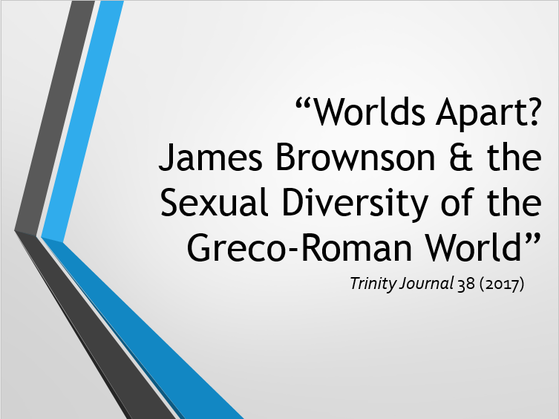I appreciate Carol Mutch’s recent engagement with the Great Lakes Catechism on the Outsights blog of Room for All. Her brief response was very helpful in elucidating her view of marriage, which I think is probably the dominant view of marriage in our culture today. It just makes sense to most people. And to be fair, there are probably a good number of people who would call themselves theological conservatives who actually share—in practice if not in theory—the key assumptions of Mutch’s argument. My response is probably going to be longer than her original article, but I really appreciate her engagement because it highlights what seems obvious about marriage and sexuality to most people in American culture today. As far as I can tell, three key assumptions are:
1.Marriage is the solution to loneliness and/or the need to walk through life with other people.
Marriage isn’t the solution to loneliness—ask any married person! But I wholeheartedly agree with what Mutch says here: “To be a human being is to want and need others to walk through life with.” And Mutch’s solution to this need—marriage—is exactly the mistake that most conservative evangelicals have been making for years, idolizing marriage as the only solution to loneliness. (I’ve written more on this faulty view of marriage as the solution to loneliness here).
Why do so many conservatives and progressives alike make this move? I think it’s worth noting that part of the nature of our current culture is that we have effectively dissolved any other relational commitments and obligations to one another that provided community and connection. So we might ask: what obligations do adult children have to their parents, and vice versa? To siblings? To extended family? To church family? To a particular place, neighborhood, or community? To a particular employer or employee? As sociologist Anthony Giddens points out, we don’t see any inherent obligations in any of those relationships anymore. If there are obligations, it’s because we’ve negotiated levels of personal and emotional commitment. The only tie that binds, including marriage, are those we decide to commit ourselves to. This being the case, though, it makes it hard to tell what makes marriage different from any other kind of commitment.
2.The idolatry of marriage and dismissal of bodies.
Note the great shift that’s currently happening between Christians who hold to the historic Christian view of marriage and the affirming folks represented by Mutch and Room for All. Thinkers and leaders like Nate Collins, Laurie Krieg, Wesley Hill, Ed Shaw, Greg Coles, David Bennett, Kutter Callaway, Preston Sprinkle, Rosario Butterfield and many others are leading the way in calling the church to truly be the church, repent of the way we’ve idolized marriage and reinvigorate true Christian friendship and community in a way that actually aligns with New Testament teaching on the church. What’s so strange about this development is that you have conservative Christians deconstructing the idolatry of marriage in a way that aligns with some non-Christian queer theorists, whereas affirming Christians end up sounding like Focus on the Family in their holding up of marriage as the only possible path to attain a “physical understanding of God’s love” (to quote Mutch) in the world! Again, to be fair, many affirming Christians were trained in the idolatry of marriage in their good conservative upbringings; they’re simply extending that principle further.
Furthermore, by defining sexual morality completely in terms of “commitment and spiritual love,” Mutch makes sexual morality completely determined by the subjective state of the parties involved. It has nothing to do with bodies (male or female) or, likely, the number of bodies or persons in relationship. She does seem to assume monogamy, but never explains or defends it, especially given the fact that her core definition of sexual morality (“commitment and spiritual love”) could certainly apply to polyamorous or polygamous relationships.
3. Marriage (and sex) have nothing to do with procreation/children.
Up until the last century, the Christian theology and practice of marriage saw procreation as an essential (though not the only) purpose of marriage. Mutch classifies this as unchristian, though she doesn’t provide any biblical or theological justification for doing so. In doing so, she follows the basic pattern that most Protestant churches have undergone; that is, we have simply abandoned procreation as an essential purpose of marriage with no biblical, theological, or ethical rationale for doing so. Though some theological conservatives might find her rationale unconvincing, I personally have found that the best way to get a bunch of conservative Christians to start sounding like sexual revolutionaries is to bring up the theological and bioethical issues surrounding procreation, contraception, sterilization, and artificial reproductive technologies (“But it’s my body!” “But if I do this/don’t do this, it will lead to suffering!” “It’s my choice!” “I can do what I want with my body and my life!”)
What Mutch and many conservatives share in common is the belief that bodies, and conjugal union, don’t actually MEAN anything. Our bodies (and what we do with them sexually) are meaningless biological bundles that we can use to express meaning, but they don’t mean anything inherently. Pope John Paul II, the foremost theologian of sexuality of our time, speaks of the “body language” of sexual union, such that in giving our bodies completely to one another, we are symbolically giving our lives to one another. And God has designed our bodies such that, as husband and wife give themselves completely to one another, the result is new life. Life-giving love produces new life. That’s a powerful image of Christ and the church, and one that depends on husband and wife, male and female.
But for most in our culture, our bodies, including their procreative capacities, are completely subject to our will. If we want to alter or interfere with properly functioning bodies/organs, that’s our prerogative. It really is scandalous to claim that procreation has something to do with sex in our culture, because we’ve reduced our bodies to nothing more than material expressions of our internal, immaterial self. To imply that the body is more than that would lead us to conclude that we are not self-created, immaterial selves, but material creatures created with a purpose and limits that we should not transgress.
One final question
Finally, I want to speak to the final question raised by Mutch: can those living in same-sex marriages be disciples of Jesus? As best as I understand Scripture, here’s how I’d answer at this point. Being a disciple of Jesus means understanding the depth of God’s love for you, shown in Jesus. Our union with Christ means that we are united with Jesus and thus have right standing before God because Jesus has clothed us with his righteousness. It’s not based on what I do or my performance. Our union with Christ has a double grace: grace that forgives AND grace that empowers us to follow Jesus and bear fruit by his Spirit in us. From Scripture, it’s clear that being God’s “holy ones,” set apart, doesn’t mean that our brokenness—which we all have, whether straight, gay, cisgender, transgender, etc.—automatically goes away. We will struggle. In 1 Corinthians, there is some serious sexual sin going on, and yet Paul writes to them as God’s “holy ones,” saints, because of their union with Christ (1:2).
So am I saying that someone in a same-sex marriage can still be a Christian, a saint, a set-apart one? Scripture leads me to say, yes, certainly that’s possible. Committing sexual sin and being a Christian are not mutually exclusive (thank God, or we’d all be in trouble!) But this set-apartness, this holiness, is not merely a positional standing but a call to be a light in the world. According to 1 Corinthians, God’s Spirit dwells in our physical bodies and has a mission for us: to be a light to the surrounding world. If we don’t embrace the difference God calls us to, we won’t be a light and we won’t be on mission. And if we’re not on mission, we do have to ask ourselves: have I really embraced God’s kingdom?
So I personally have no ability to say “who’s in” and “who’s out” in some kind of ultimate, eternal way. Everything in Scripture (and good Reformed theology!) speaks against doing that. But Scripture does speak clearly to whether we’re on mission or not. There are certain ways of life, certain ways of using money, sex, and power, that display God’s kingdom to a watching world. And there are ways that are not. To be clear, I believe that Scripture teaches that there’s a very narrow window of expression for sexuality and marriage that embodies this missional focus: as a celibate member of the body of Christ joined with other members of Christ’s body in pursuit of mission together or as husband and wife joined in lifelong faithfulness to one another and as faithful members of the body of Christ in pursuit of mission together.
Being a disciple of Jesus is not about sinless perfection in this life, but it is about embracing repentance as a way of life, engaging in the ongoing putting to death of our sin and coming to life in the Spirit so that our gratitude leads us deeper into communion with God and mission in the world.
Again, I am grateful to Room for All and for Carol Mutch for her willingness to engage the Great Lakes Catechism and reflect on her own view of marriage in light of it.
1.Marriage is the solution to loneliness and/or the need to walk through life with other people.
Marriage isn’t the solution to loneliness—ask any married person! But I wholeheartedly agree with what Mutch says here: “To be a human being is to want and need others to walk through life with.” And Mutch’s solution to this need—marriage—is exactly the mistake that most conservative evangelicals have been making for years, idolizing marriage as the only solution to loneliness. (I’ve written more on this faulty view of marriage as the solution to loneliness here).
Why do so many conservatives and progressives alike make this move? I think it’s worth noting that part of the nature of our current culture is that we have effectively dissolved any other relational commitments and obligations to one another that provided community and connection. So we might ask: what obligations do adult children have to their parents, and vice versa? To siblings? To extended family? To church family? To a particular place, neighborhood, or community? To a particular employer or employee? As sociologist Anthony Giddens points out, we don’t see any inherent obligations in any of those relationships anymore. If there are obligations, it’s because we’ve negotiated levels of personal and emotional commitment. The only tie that binds, including marriage, are those we decide to commit ourselves to. This being the case, though, it makes it hard to tell what makes marriage different from any other kind of commitment.
2.The idolatry of marriage and dismissal of bodies.
Note the great shift that’s currently happening between Christians who hold to the historic Christian view of marriage and the affirming folks represented by Mutch and Room for All. Thinkers and leaders like Nate Collins, Laurie Krieg, Wesley Hill, Ed Shaw, Greg Coles, David Bennett, Kutter Callaway, Preston Sprinkle, Rosario Butterfield and many others are leading the way in calling the church to truly be the church, repent of the way we’ve idolized marriage and reinvigorate true Christian friendship and community in a way that actually aligns with New Testament teaching on the church. What’s so strange about this development is that you have conservative Christians deconstructing the idolatry of marriage in a way that aligns with some non-Christian queer theorists, whereas affirming Christians end up sounding like Focus on the Family in their holding up of marriage as the only possible path to attain a “physical understanding of God’s love” (to quote Mutch) in the world! Again, to be fair, many affirming Christians were trained in the idolatry of marriage in their good conservative upbringings; they’re simply extending that principle further.
Furthermore, by defining sexual morality completely in terms of “commitment and spiritual love,” Mutch makes sexual morality completely determined by the subjective state of the parties involved. It has nothing to do with bodies (male or female) or, likely, the number of bodies or persons in relationship. She does seem to assume monogamy, but never explains or defends it, especially given the fact that her core definition of sexual morality (“commitment and spiritual love”) could certainly apply to polyamorous or polygamous relationships.
3. Marriage (and sex) have nothing to do with procreation/children.
Up until the last century, the Christian theology and practice of marriage saw procreation as an essential (though not the only) purpose of marriage. Mutch classifies this as unchristian, though she doesn’t provide any biblical or theological justification for doing so. In doing so, she follows the basic pattern that most Protestant churches have undergone; that is, we have simply abandoned procreation as an essential purpose of marriage with no biblical, theological, or ethical rationale for doing so. Though some theological conservatives might find her rationale unconvincing, I personally have found that the best way to get a bunch of conservative Christians to start sounding like sexual revolutionaries is to bring up the theological and bioethical issues surrounding procreation, contraception, sterilization, and artificial reproductive technologies (“But it’s my body!” “But if I do this/don’t do this, it will lead to suffering!” “It’s my choice!” “I can do what I want with my body and my life!”)
What Mutch and many conservatives share in common is the belief that bodies, and conjugal union, don’t actually MEAN anything. Our bodies (and what we do with them sexually) are meaningless biological bundles that we can use to express meaning, but they don’t mean anything inherently. Pope John Paul II, the foremost theologian of sexuality of our time, speaks of the “body language” of sexual union, such that in giving our bodies completely to one another, we are symbolically giving our lives to one another. And God has designed our bodies such that, as husband and wife give themselves completely to one another, the result is new life. Life-giving love produces new life. That’s a powerful image of Christ and the church, and one that depends on husband and wife, male and female.
But for most in our culture, our bodies, including their procreative capacities, are completely subject to our will. If we want to alter or interfere with properly functioning bodies/organs, that’s our prerogative. It really is scandalous to claim that procreation has something to do with sex in our culture, because we’ve reduced our bodies to nothing more than material expressions of our internal, immaterial self. To imply that the body is more than that would lead us to conclude that we are not self-created, immaterial selves, but material creatures created with a purpose and limits that we should not transgress.
One final question
Finally, I want to speak to the final question raised by Mutch: can those living in same-sex marriages be disciples of Jesus? As best as I understand Scripture, here’s how I’d answer at this point. Being a disciple of Jesus means understanding the depth of God’s love for you, shown in Jesus. Our union with Christ means that we are united with Jesus and thus have right standing before God because Jesus has clothed us with his righteousness. It’s not based on what I do or my performance. Our union with Christ has a double grace: grace that forgives AND grace that empowers us to follow Jesus and bear fruit by his Spirit in us. From Scripture, it’s clear that being God’s “holy ones,” set apart, doesn’t mean that our brokenness—which we all have, whether straight, gay, cisgender, transgender, etc.—automatically goes away. We will struggle. In 1 Corinthians, there is some serious sexual sin going on, and yet Paul writes to them as God’s “holy ones,” saints, because of their union with Christ (1:2).
So am I saying that someone in a same-sex marriage can still be a Christian, a saint, a set-apart one? Scripture leads me to say, yes, certainly that’s possible. Committing sexual sin and being a Christian are not mutually exclusive (thank God, or we’d all be in trouble!) But this set-apartness, this holiness, is not merely a positional standing but a call to be a light in the world. According to 1 Corinthians, God’s Spirit dwells in our physical bodies and has a mission for us: to be a light to the surrounding world. If we don’t embrace the difference God calls us to, we won’t be a light and we won’t be on mission. And if we’re not on mission, we do have to ask ourselves: have I really embraced God’s kingdom?
So I personally have no ability to say “who’s in” and “who’s out” in some kind of ultimate, eternal way. Everything in Scripture (and good Reformed theology!) speaks against doing that. But Scripture does speak clearly to whether we’re on mission or not. There are certain ways of life, certain ways of using money, sex, and power, that display God’s kingdom to a watching world. And there are ways that are not. To be clear, I believe that Scripture teaches that there’s a very narrow window of expression for sexuality and marriage that embodies this missional focus: as a celibate member of the body of Christ joined with other members of Christ’s body in pursuit of mission together or as husband and wife joined in lifelong faithfulness to one another and as faithful members of the body of Christ in pursuit of mission together.
Being a disciple of Jesus is not about sinless perfection in this life, but it is about embracing repentance as a way of life, engaging in the ongoing putting to death of our sin and coming to life in the Spirit so that our gratitude leads us deeper into communion with God and mission in the world.
Again, I am grateful to Room for All and for Carol Mutch for her willingness to engage the Great Lakes Catechism and reflect on her own view of marriage in light of it.





 RSS Feed
RSS Feed